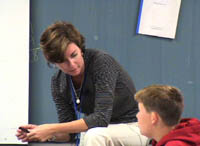Classroom Videos Focus in on Teacher Questions, Algebra Learning

-
A teacher and student from the algebra learning study
How do instruction, curriculum, and professional development influence middle grades students’ algebra learning? Project 2061, in collaboration with the University of Delaware and Texas A&M University, investigated this question as part of an Interagency Education Research Initiative (IERI) project to study the impact of professional development and curriculum materials on instruction and student achievement for specific learning goals in middle school mathematics. At the American Educational Research Association (AERA) Annual Meeting in April, the research team reported their findings related to students’ learning about the algebraic concept of change.
To investigate the factors influencing algebra learning, the researchers took a unique approach. They focused all aspects of the study on a single clearly defined learning goal for grades 7 and 8:
Symbolic equations can be used to summarize how the quantity of something changes over time or in response to other changes.
Over three years, this learning goal was taught by almost 50 teachers in two widely divergent states using four different curricula. With nearly 240 videos of instruction on the algebra learning goal and assessment data on the learning goal for almost 2500 students, the resulting data set is one of the largest of its type ever collected. The analysis of teachers’ instruction is also one of the most intensive ever accomplished, with the videos parsed into over 3700 separate events.
At AERA, Project 2061 Director Jo Ellen Roseman chaired a symposium in which the researchers presented multiple research perspectives on the data collected. Project 2061’s Linda Wilson provided background on the measures used for teaching and learning in the study, Victor Willson of Texas A&M University reported on the statistical methods and results of the work, and Jon Manon of the University of Delaware discussed how two specific cases of teachers interacting with students helped them to interpret the findings. The team stressed the importance of both the quantitative and qualitative analyses as they discussed their main finding, that the more teachers asked guiding questions of high quality, the more the students learned.
You will find the full conference paper below, which reports on the methods used, the quantitative results, and an in-depth analysis of two teachers with similar teaching assignments but somewhat different patterns of encouraging student explanations and asking guiding questions that advance student thinking toward the learning goal. Additional findings will be reported as the researchers continue their investigations of the study’s data.
Factors Influencing Middle Grades Students’ Algebra Learning: Multiple Research Perspectives
Linda Dager Wilson, Victor L. Willson, Jon Rahn Manon, Ross Larsen, Yan Li, and Jo Ellen Roseman
Read the full paper. [PDF, 204KB]
View slides from a presentation based on the study data. [PDF, 75KB]
# # #
The IERI study, jointly funded by the Department of Education, National Institutes of Health, and the National Science Foundation, was based on Project 2061’s earlier studies of the quality of textbooks’ support for middle school mathematics teaching and learning (see Middle Grades Mathematics Textbooks: A Benchmarks-Based Evaluation).
For more information about Project 2061’s research on middle grades mathematics, please contact:
Principal Investigator: Dr. Jo Ellen Roseman, (202) 326-6752
Consultant: Dr. Linda Wilson, (202) 326-6209




